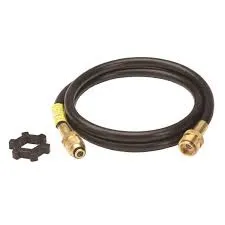bulk fuel hose
9-р сар . 21, 2024 15:27 Back to list
bulk fuel hose
Understanding Bulk Fuel Hose Essential for Safe Fuel Transfer
When it comes to the transportation of fuels, whether it's gasoline, diesel, or aviation fuel, one crucial component that should not be overlooked is the bulk fuel hose. These specialized hoses play a vital role in ensuring safe, efficient, and reliable fuel transfer across a variety of applications, from fueling stations to agricultural uses, construction sites, and more.
What is Bulk Fuel Hose?
Bulk fuel hoses are designed specifically for transferring large volumes of fuel. Typically made from durable materials such as rubber or thermoplastic, they are engineered to withstand the challenging conditions associated with fuel handling. This includes exposure to various chemicals, UV radiation, and extreme temperatures. The construction of these hoses often features multiple layers, which provide strength, flexibility, and resistance to abrasion and kink.
Key Features
1. Certification and Standards Bulk fuel hoses must comply with specific industry standards and certifications to ensure they are safe for use. These standards often include guidelines from organizations such as the American Petroleum Institute (API), Underwriters Laboratories (UL), and other regulatory bodies.
2. Temperature and Pressure Ratings Different fuels require hoses that can handle varying temperatures and pressures. It's essential to select a hose that meets the specific requirements of the fuel being transferred. For instance, diesel fuel may require a different type of hose than gasoline due to differences in chemical properties.
3. Compatibility The materials used in bulk fuel hoses must be compatible with the type of fuel being handled. This minimizes the risk of degradation, leaks, or other failures that could lead to hazardous situations.
bulk fuel hose

4. Length and Diameter Bulk fuel hoses come in various lengths and diameters to accommodate different operational needs. Choosing the correct size is crucial to ensure optimal flow rates and minimize pressure loss during fuel transfer.
Importance of Bulk Fuel Hose in Operations
Using the correct bulk fuel hose is critical for safety and efficiency in operations. Inappropriate or inferior hoses can lead to fuel spills, which not only pose environmental risks but also have serious financial implications. Spills can lead to costly clean-up operations, potential legal liabilities, and damage to a company’s reputation.
Furthermore, the reliability of a bulk fuel hose impacts the overall efficiency of fuel transfer operations. High-quality hoses ensure that the flow is steady, reducing wait times and increasing productivity.
Maintenance and Inspection
Regular inspection and maintenance of bulk fuel hoses are essential to ensure their longevity and performance. Users should regularly check for signs of wear, cracks, or any other damage. Additionally, proper storage when not in use can also extend the lifespan of the hose. Hoses should be kept in a cool, dry place away from direct sunlight to prevent UV damage.
Conclusion
In conclusion, bulk fuel hoses are an indispensable part of the fuel transfer process across various industries. Their specialized design and construction contribute to safe and efficient fuel handling. By adhering to industry standards and performing regular maintenance, businesses can ensure that their fuel transfer operations run smoothly, minimizing risks and maximizing productivity. Whether you are in the transportation, construction, or agricultural industries, investing in high-quality bulk fuel hoses is essential for operational success and environmental protection.
